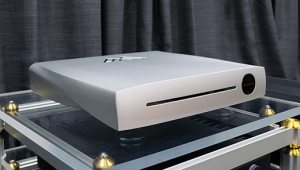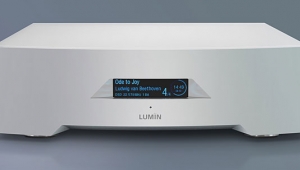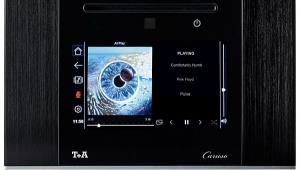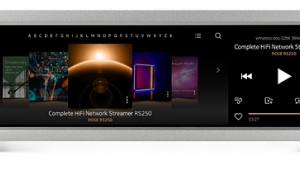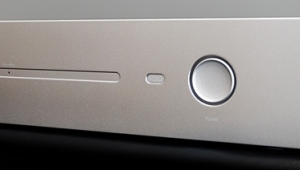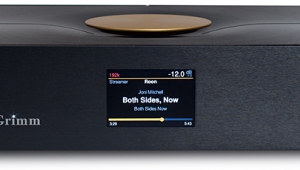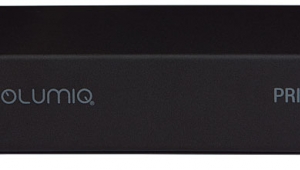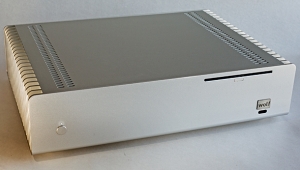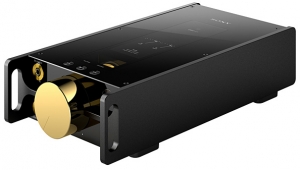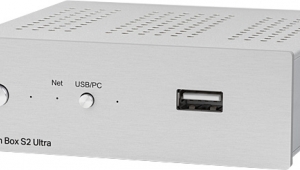| Columns Retired Columns & Blogs |
Apple iPod portable music player Letters, December 2003
Letters in response appeared in December 2003 (Vol.26 No.12):
iPods & MP3s
Editor: Almost two years ago, after reading a thread at rec.audio.high-end—go to groups.google.com and enter "what makes a CD player high-end" in the search field—I held a brief e-mail discussion with Kalman Rubinson, both about the iPod and the sound quality of MP3 files compared to 16-bit PCM. According Mr. Rubinson, while MP3 was okay for very casual listening, it did not cut it for serious listening over a decent system.
Having connected my 15GB iPod to my Krell and B&W Nautilus rig using an inexpensive cable from Monster Cable, I got decent results with MP3s encoded at 192kbps or higher bit rates. At 256kbps with VBR, or simply playing uncompressed AIFF files, I would say that the iPod is appropriate for "serious" listening to rock, jazz, and pop music.
Furthermore, I have also made some comparisons, and you know what? It was very difficult for me to distinguish any difference between MP3s played on the iPod and CDs played on my Meridian 588 CD player.
For even better sound quality on the go, I strongly recommend using good cans, like the Sennheiser HD 600s, and a headphone amplifier. An easy-to-build DIY headphone amp can be found at here. I have assembled it using Analog Devices' AD8620 dual op-amp and Elantec's EL2001 buffers, and the sound is superb. (A few pics of my headphone amp can be found here.)
As an early iPod adopter, it has been a great pleasure to me to read Wes Phillips' review and JA's measurements in October.—Claudio González Rodil, aka Rodelius, Madrid, Spain, claudio@rodilherraiz.com
iPods & details
Editor: First of all, I'd like to thank Wes Phillips for reviewing a device like the iPod in the first place (October 2003). It's really neat to see Stereophile review a piece of equipment that has buzz among the youngsters and is relatively affordable at that. Kudos. Of course, if that was all I had to say, I probably wouldn't be writing. I'd like to address a few spots in the article that were incorrect, or where I just feel I have something to say.
The iPod's operating system is actually a mixture of different operating-system components from different vendors. Yes, the core operating system and decoders are from Portal Player, but the software toolkit on which the GUI is based is from a company called Pixo. The GUI itself was designed and implemented by Apple engineers.
The independent labels are coming to the iTunes Music Store. It's just taking time to get everyone set up with the ability to submit their songs. Certain indie labels, like Matador, are there now.
Regarding JA's comment about preserving the pre-emphasis flag: There is no defined mechanism in the AIFF or WAV file-format specifications for storing that information, so it's unlikely that you'll find an app that will preserve the flag when ripping to AIFF/WAV.
Again, thanks for the great article! I love my iPod. It looks like iTunes for Windows is finally here, so you'll be able to junk Music Match for good. Welcome to the Light Side.—Stephen Davis, stephendavis@mac.com
Error in your story
In your Oct 2003 story about the Apple iPod Wes Phillips mentioned: "One item that's invisible but indispensable is the iPod's operating system, which, I've been informed, is not of Apple design. PortalPlayer, a company that specializes in developing OSes for cellular phones, PDAs, and other streaming and wireless applications, designed the iPod's human interface. The iPod is so easy to use that it's obvious Apple chose the right company for the job."
PortalPlayer was not the company that developed the OS that drives the UI for the iPod, Pixo was. Pixo has since been purchased by Sun Microsystems. Don't start any rumors, Sun bought them for their Java based cell phone provisioning server, not the OS used in the iPod.
Additionally, while Pixo was heavily involved in the design and implementation of the original iPod, Apple did the most of the actual visual design of the UI.
PortalPlayer does provide the core chipset that is included in the iPod as well as the core RTOS based on RTXC. Apple engineers provide many of the software components and since the 1.0 product have been doing all of the core software development.—Mike Neil, Former Architect of the Pixo OS
iPods & internal components
Editor: I'm a developer of accessories for the Apple iPod; my company also publishes the iPoding website. Anyone familiar with the internal components of the iPod will instantly notice that Wes Phillips didn't describe the inside of the new iPod in his October review. He has done a disservice to Stereophile and to its readers. I hope that, as a responsible journalist, you will inform your readers of this fabrication.—A.J. Fouladpour, ajf@sik.com
Thank you for the clarification, Mr. Fouladpour. In describing the iPod's innards, I relied on the expertise of a friend who regularly services portables. Apparently I did not understand that he was walking me through his older model, not the newest. I'm sorry for the error—there was certainly no intent to misinform.—Wes Phillips
Photographs of the iPod's innards can be found at the ipoding website.—John Atkinson
iPods & alternatives #1
Editor: As a longtime fan of Wes Phillips' audio reviews (and a still-happy owner of a Meridian 508.24 bought on his recommendation), I was intrigued to read his review of the iPod. There has been quite a lot of discussion in various Internet forums regarding the sonic differences between the iPod and the Creative Labs Nomad Zen NX, with, it seems to me, a substantial majority of folks who have tried both units favoring the Nomad Xen NX (and the sonically identical Nomad Zen).
It would be interesting to get Wes's comparative opinion of the two units. I have heard both, but the iPod only briefly. They do sound quite different from each other, and I would tentatively agree strongly with those who favor the Zen NX (for sound, not for design).—Tom Digby, Ph.D., Springfield, MA, tom.digby@verizon.net
iPods & alternatives #2
Editor: I was pleasantly surprised to read the detailed review of the Apple iPod in the October 2003 issue. Kudos for performing the signal measurements normally done for high-end components. I would love to see a similar review done for the Turtle Beach Audiotron. It requires a home network but handles WAV files flawlessly and includes an S/PDIF output. It has a street price of about $270.—Dave Axness, axnessdd@yahoo.com
iPods & roadblocks
Editor: Thanks for publishing Wes Phillips' review of the Apple iPod in October. I wish Wes had commented on the issue of gapless playback on computer-media players, as this is probably the most significant roadblock preventing many classical-music listeners from using such players.
Much classical music is mastered as one continuous acoustic event, with track indices marking breaks in the music but not necessarily breaks in the acoustic event. Playback of such music on MP3 players can be jarring because the hall ambience, sound decay between tracks, or even notes in pieces whose movements follow continuously (eg, the Mendelssohn violin concerto) are interrupted by clicks or arbitrarily long digital silences.
One workaround for this problem is to combine all tracks into one MP3 file, but this is unacceptable because one loses the track indexing for quickly advancing through the music.
Though classical-music listeners are but a small fraction of the music market, I've been told that some music in other genres, especially live recordings, is starting to be mastered as one continuous acoustic event. I hope that Stereophile can bring some attention to this issue; ultimately, if computer-based music media are to replace traditional music media, especially because they promise greater ease of use and access, they should be able to perform all the user-interface functions of the media they replace.—Andre Yew, Santa Barbara, CA, andrey@silcom.com
iPods & AIFFs
Editor: Wes Phillips states in his October 2003 review that the Apple iPod supports AIFF (Audio Interchange File Format) and WAV files—uncompressed audio, which is a must for any true audiophile. Apple states this too, on their iPod specifications site. However, did Mr. Phillips actually try this feature? Did he try it on any song longer than two and a half minutes?
The iPod has 32MB of RAM, 4MB of which are used for the operating system; the other 28MB are used for buffering data from the hard drive. This is what gives the iPod its incredible battery life and shock resistance: the hard drive runs only part of the time, pulling data off to feed the memory buffer. When the memory buffer is full, the hard drive stops spinning until the memory is empty again. However, where Apple failed was that the iPod does not have the ability to read from its RAM chip while writing to it—which means that when it has played out the full 28MB, playback has to stop for one to two seconds while it reloads the buffer.
Most users won't notice this because, with a 128kbps MP3 or AAC file, you can go through more than half an hour of audio before it has to reload, and the buffer can also reload between songs, during the silences there. However, with a long, uncompressed track—say, the first movement of a Mozart symphony—playback has to stop two and a half minutes in (at the 28MB point) while the RAM buffer loads another chunk of data. It will then stop again two and a half minutes later.
The AIFF and WAV support for iPod seems to really be just a marketing gimmick, a way to beef up the numbers sheet. The iPod was never really designed for it. Don't get me wrong—I love my iPod. But I returned two in a row for this exact problem before Apple's service department admitted that this is what's going on.—Dan Rose, drose@wbur.bu.edu, Assistant Chief Engineer, WBUR-FM, Executive Committee, Boston Audio Engineering Society
I am not sure if Wes Phillips did, Mr. Rose, but I have tried playing long AIFF files on my own 30GB iPod. Only last night, for example, I was listening to some uncompressed test mixes of some of my recordings, each between four and five minutes long. They played back without any glitches. Although, like Mr. Yew, I have been bothered by silences inserted between classical tracks, where the ambient noise should have been continuous, I assume this is due to the player's hard drive needing time to load the next track's data into RAM.
According to ipodhacks.com, songs that are too large to fit into its RAM cache are played by the iPod straight from its drive, or at least in some mode that does not use the full cache, perhaps using it as a conventional FIFO buffer. I have noticed that you get shorter battery life playing back long AIFF files, and that the player is much more sensitive to shocks when it does so, both of which suggest that the hard drive is being spun up more often.—John Atkinson
- Log in or register to post comments
